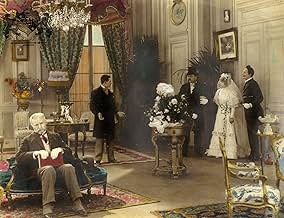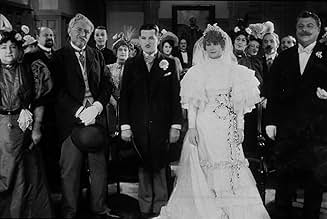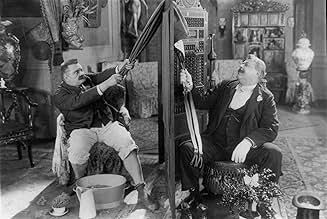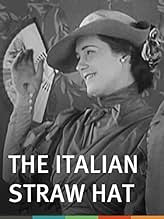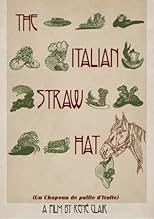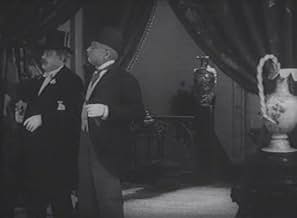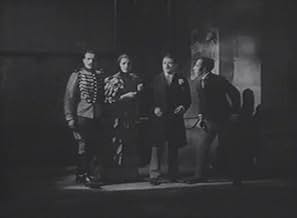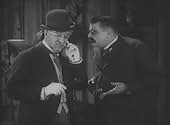AVALIAÇÃO DA IMDb
6,8/10
979
SUA AVALIAÇÃO
Adicionar um enredo no seu idiomaOn his way through the woods to his marriage, Fadinard's horse eats the hat of a married lady spending here a few moments with her lover. Fadinard has to find the very same rare hat to avoid... Ler tudoOn his way through the woods to his marriage, Fadinard's horse eats the hat of a married lady spending here a few moments with her lover. Fadinard has to find the very same rare hat to avoid her dishonor. This will greatly disturb his own marriage.On his way through the woods to his marriage, Fadinard's horse eats the hat of a married lady spending here a few moments with her lover. Fadinard has to find the very same rare hat to avoid her dishonor. This will greatly disturb his own marriage.
- Direção
- Roteiristas
- Artistas
Alice Tissot
- Une cousine
- (as Mme Alice Tissot)
Alexej Bondireff
- Un cousin
- (as M. Alexis Bondi)
Marise Maia
- La mariée
- (as Mlle Maryse Maia)
Yvonneck
- Nonancourt
- (as M. Yvonneck)
Louis Pré Fils
- Cousin Bobin
- (as M. Pré fils)
Albert Préjean
- Fadinard, le marié
- (as M. Albert Préjean)
Geymond Vital
- Le lieutenant Tavernier
- (as M. Vital Geymond)
Olga Tschechowa
- Anaïs de Beauperthuis
- (as Mme Olga Tschekova)
Paul Ollivier
- L'oncle Vézinet
- (as M. Paul Olivier)
Alex Allin
- Félix
- (as M. Alex Allin)
André Volbert
- Le maire
- (as M. Volbert)
Jim Gérald
- Beauperthuis
- (as M. Jim Gérald)
Lya Christy
- Une invitée de la noce
- (as Christie)
Nino Constantini
- Un invité de la noce
- (as Nino Costantini)
A. Debriège
- Une invitée de la noce
- (as Albany Debriège)
- Direção
- Roteiristas
- Elenco e equipe completos
- Produção, bilheteria e muito mais no IMDbPro
Avaliações em destaque
It has been a few years since I have seen this film, but at the time I rated it with the best comedies ever made, and filled with that graceful combination of high style and laugh-out-loud humor that seems to have disappeared from movie making except in an occasional rarity like Amelie--which to be honest, is more charming and touching than really funny.
Granted, comedy, more than any other genre, seems to be a matter of personal taste, but for those who can appreciate comedy that skewers and at the same time celebrates social mores. that relies on visual humor rather than jokes, and that doesn't need to resort to bathroom vulgarisms to get a laugh, then you might enjoy this film as much as I did.
Granted, comedy, more than any other genre, seems to be a matter of personal taste, but for those who can appreciate comedy that skewers and at the same time celebrates social mores. that relies on visual humor rather than jokes, and that doesn't need to resort to bathroom vulgarisms to get a laugh, then you might enjoy this film as much as I did.
Silent film fans are really in for a treat with this DVD. Once again, Flicker Alley has released a terrific DVD--with a nearly pristine print (very rare for a silent), some nice special features as well as two different sound tracks for this movie! Each time I see one of their films, I marvel at the amazing care they give each release--and it's the class of the industry.
"The Italian Straw Hat" is film that was a bit short on plot but is still well worth seeing. This is because the director, René Clair, did a masterful job with this movie--with great camera-work and composition throughout. Unfortunately, despite looking great the plot keeps me from giving the movie an even higher score. The problem is that although the story is entertaining, it just had too many holes--too many situations that simply were too hard to believe and could have EASILY been resolved...but weren't.
The film begins with a bridegroom traveling by horse and buggy to his wedding. On the way, he gets out and his horse keeps walking--and finds a straw hat that it begins to eat! Naturally, the lady who owned the hat was angry and her lover was ready to fight. The bridegroom tried to pay for it but the couple insisted he find a replacement hat. And, they follow him into town and continue to insist--even moving into his apartment and threatening to destroy the place unless he get an identical hat. It turns out it's because the woman is married to a different man and doesn't want to have to explain to him what happened to the hat. But why the couple squatted for many hours in the house seemed forced--and why the bridegroom didn't just go to the police made no sense either. But, it did have lots of cute and mildly funny moments--even if the story just made no sense.
Overall, the film is expertly filmed but inconsequential because of the writing. It's worth seeing if you love silents or if you want to see a silent that manages to have very, very few intertitle cards yet tells the story very well. Otherwise, there are better silents out there--even with the great Flicker Alley package.
"The Italian Straw Hat" is film that was a bit short on plot but is still well worth seeing. This is because the director, René Clair, did a masterful job with this movie--with great camera-work and composition throughout. Unfortunately, despite looking great the plot keeps me from giving the movie an even higher score. The problem is that although the story is entertaining, it just had too many holes--too many situations that simply were too hard to believe and could have EASILY been resolved...but weren't.
The film begins with a bridegroom traveling by horse and buggy to his wedding. On the way, he gets out and his horse keeps walking--and finds a straw hat that it begins to eat! Naturally, the lady who owned the hat was angry and her lover was ready to fight. The bridegroom tried to pay for it but the couple insisted he find a replacement hat. And, they follow him into town and continue to insist--even moving into his apartment and threatening to destroy the place unless he get an identical hat. It turns out it's because the woman is married to a different man and doesn't want to have to explain to him what happened to the hat. But why the couple squatted for many hours in the house seemed forced--and why the bridegroom didn't just go to the police made no sense either. But, it did have lots of cute and mildly funny moments--even if the story just made no sense.
Overall, the film is expertly filmed but inconsequential because of the writing. It's worth seeing if you love silents or if you want to see a silent that manages to have very, very few intertitle cards yet tells the story very well. Otherwise, there are better silents out there--even with the great Flicker Alley package.
Report from Cinesation 2006: AN Italian STRAW HAT (***) Rene Clair had a huge reputation in the early days of sound, and though it's not hard to see why, it is hard to see why the same critics who loved his films (often voting them onto the early Sight & Sound lists of the best films of all time) were dismissive of great Hollywood comedies with exactly the same virtues. (A Nous la Liberte and Le Million are delightful, for instance, but in no way that Duck Soup and Top Hat aren't equally or more delightful.)
This-- based on a perennial stage farce about the complications that follow when a horse eats a married woman's hat while she's off dallying with her lover-- is skillful enough, and it has a few very funny moments, but made mostly in medium or longshot with little subtlety in the playing, it seemed far more primitive for 1927 than, to pick one American comedy, Kiki (shown earlier the same day)-- and the audience at Cinesation didn't laugh nearly as often, either.
This-- based on a perennial stage farce about the complications that follow when a horse eats a married woman's hat while she's off dallying with her lover-- is skillful enough, and it has a few very funny moments, but made mostly in medium or longshot with little subtlety in the playing, it seemed far more primitive for 1927 than, to pick one American comedy, Kiki (shown earlier the same day)-- and the audience at Cinesation didn't laugh nearly as often, either.
It may sound a bit odd to call a 1927 film a salute to early cinema but as silent film enthusiasts know, movies have been around since before the dawn of the 20th century. The earliest narrative films come from France in the movies of Alice Guy and Georges Melies ca. 1896 and it is those along with the films of French comedian Max Linder that Clair is channeling in THE ITALIAN STRAW HAT. The original source material is a play in the popular French farce style of domestic complications that date all the way back to Moliere.
The year is 1895. A young man on his wedding day must replace a fashionable Italian straw hat which his horse has eaten or face serious consequences from a hot tempered Hussar (the hat belongs to his lover and she can't go home to her husband without it). The director takes this scenario and turns it into a sophisticated comedy of manners a la Oscar Wilde only it's done without dialogue (and very few title cards). While I found it a little too genteel and slow moving at times, THE ITALIAN STRAW HAT still remains a truly great film when you realize what Rene Clair was trying to do and how well he succeeded.
The only other version I had seen of this was an old but decent VHS copy that ran only 84 minutes. This version, at 105 minutes, is not only complete, but it adds little touches that make the film a richer experience. I was struck throughout at how much Albert Prejean (the groom) resembled Charley Chase. In fact this could have made a fine comedy vehicle for Charley. As is now expected of Flicker Alley, the transfer is first rate and the choice of two scores and an informative booklet enhance the presentation.
While Philip Carli's piano score is extremely well done (as they always are), I really enjoyed the Mont Alto Motion Picture Orchestra's chamber score with its liberal use of Offenbach's TALES OF HOFFMANN and Otto Nicolai's MERRY WIVES OF WINDSOR Overture. THE ITALIAN STRAW HAT is the ultimate proof that silent comedy could be sophisticated and delicate and, in the hands of a gifted director like Rene Clair, use subtle visuals to help make the story more vivid. This DVD also comes with Clair's short film on the Eiffel Tower (awe-inspiring) and a short 1907 wedding comedy from Ferdinand Zecca. A must for anyone interested in silent European cinema.
The year is 1895. A young man on his wedding day must replace a fashionable Italian straw hat which his horse has eaten or face serious consequences from a hot tempered Hussar (the hat belongs to his lover and she can't go home to her husband without it). The director takes this scenario and turns it into a sophisticated comedy of manners a la Oscar Wilde only it's done without dialogue (and very few title cards). While I found it a little too genteel and slow moving at times, THE ITALIAN STRAW HAT still remains a truly great film when you realize what Rene Clair was trying to do and how well he succeeded.
The only other version I had seen of this was an old but decent VHS copy that ran only 84 minutes. This version, at 105 minutes, is not only complete, but it adds little touches that make the film a richer experience. I was struck throughout at how much Albert Prejean (the groom) resembled Charley Chase. In fact this could have made a fine comedy vehicle for Charley. As is now expected of Flicker Alley, the transfer is first rate and the choice of two scores and an informative booklet enhance the presentation.
While Philip Carli's piano score is extremely well done (as they always are), I really enjoyed the Mont Alto Motion Picture Orchestra's chamber score with its liberal use of Offenbach's TALES OF HOFFMANN and Otto Nicolai's MERRY WIVES OF WINDSOR Overture. THE ITALIAN STRAW HAT is the ultimate proof that silent comedy could be sophisticated and delicate and, in the hands of a gifted director like Rene Clair, use subtle visuals to help make the story more vivid. This DVD also comes with Clair's short film on the Eiffel Tower (awe-inspiring) and a short 1907 wedding comedy from Ferdinand Zecca. A must for anyone interested in silent European cinema.
"Un Chapeau De Paille D'Italie" can be considered, by this German count's standards, as a transgressor silent film in spite of its classical conventionalism; this particular Teutonic riddle has a Germanic and even logical explanation that will be understood by the longhaired silent youngsters around the world right now.
"Un Chapeau De Paille D'Italie" was directed by the great but French silent director Herr René Clair in the silent year of 1928, after he had directed important, avant-garde, experimental and overall, non conventional silent oeuvres such "Entr'acte" (1924), "Paris Qui Dort" (1925), "Le Voyage Imaginaire" (1925) or "La Tour" (1928); so, having this in mind, then the Germanic assessment mentioned before by this Herr Graf has a solid basis. "Un Chapeau " is a completely different and classic film in comparison with those earlier Clair films and this doesn't mean that "Un Chapeau " is a minor work in Herr Clair 's career; on the contrary, the film is a remarkable, stylized and even provocative comedy.
The incident of the Italian straw hat occurs just before our hero marries, and leads to a series of well placed and paced episodes. The elegant and hilarious scenes depicting the troubles and crossed situations among the just married couple and their wedding guests with the adulterous couple, achieve very remarkable moments. The skillful use of the camera emphasizes the rhythm depending the different scenes, and includes the camera tricks and techniques that Herr Clair was so fond of. The result is a vigorous and sophisticated comedy with a irreverent undercurrent subject in the main plot: a just married man must assume the complicated task of protecting an adulterer.
Helping our hero in such a hazardous mission are excellent supporting actors, playing peculiar characters who are involved unnoticed in this peculiar wedding and will suffer the happenings around the Italian straw hat, a hilarious gallery of guests who have had the misfortune to be part of such a troublesome wedding.
The film is placed at the end of the old XIX century probably in order to take advantage of the human behaviours and fashion of those old times in which the ladies wore elegant hats ( those fräuleins of nowadays showing their loose hair in public!, Mein Gott! ). There is a careful atmosphere of ancient and decadent custom ( faithful characteristics, after all, in Herr Clair films ) that suits the film perfectly. Herr Clair has directed a "classic", stylized and cynical silent comedy that has the same original merits of his most experimental early works.
And now, if you'll allow me, I must temporarily take my leave because this German Count must find his Prussian helmet in order to eat his breakfast properly.
"Un Chapeau De Paille D'Italie" was directed by the great but French silent director Herr René Clair in the silent year of 1928, after he had directed important, avant-garde, experimental and overall, non conventional silent oeuvres such "Entr'acte" (1924), "Paris Qui Dort" (1925), "Le Voyage Imaginaire" (1925) or "La Tour" (1928); so, having this in mind, then the Germanic assessment mentioned before by this Herr Graf has a solid basis. "Un Chapeau " is a completely different and classic film in comparison with those earlier Clair films and this doesn't mean that "Un Chapeau " is a minor work in Herr Clair 's career; on the contrary, the film is a remarkable, stylized and even provocative comedy.
The incident of the Italian straw hat occurs just before our hero marries, and leads to a series of well placed and paced episodes. The elegant and hilarious scenes depicting the troubles and crossed situations among the just married couple and their wedding guests with the adulterous couple, achieve very remarkable moments. The skillful use of the camera emphasizes the rhythm depending the different scenes, and includes the camera tricks and techniques that Herr Clair was so fond of. The result is a vigorous and sophisticated comedy with a irreverent undercurrent subject in the main plot: a just married man must assume the complicated task of protecting an adulterer.
Helping our hero in such a hazardous mission are excellent supporting actors, playing peculiar characters who are involved unnoticed in this peculiar wedding and will suffer the happenings around the Italian straw hat, a hilarious gallery of guests who have had the misfortune to be part of such a troublesome wedding.
The film is placed at the end of the old XIX century probably in order to take advantage of the human behaviours and fashion of those old times in which the ladies wore elegant hats ( those fräuleins of nowadays showing their loose hair in public!, Mein Gott! ). There is a careful atmosphere of ancient and decadent custom ( faithful characteristics, after all, in Herr Clair films ) that suits the film perfectly. Herr Clair has directed a "classic", stylized and cynical silent comedy that has the same original merits of his most experimental early works.
And now, if you'll allow me, I must temporarily take my leave because this German Count must find his Prussian helmet in order to eat his breakfast properly.
Você sabia?
- CuriosidadesRestored in April 2016 through a partnership between the Cinematheque Francaise and the San Francisco Silent Film Festival, with the support of the CNC and Arte France. The new 4K restoration is based on the René Clair's original camera negative which is preserved at the Cinematheque Francaise.
- Erros de gravaçãoAfter the chair has been loaded onto the cart in a medium shot, the next long shot shows it in a different position.
- Versões alternativasThere is an Italian edition of this film on DVD, distributed by DNA srl, "UN CAPPELLO DI PAGLIA DI FIRENZE (1928) + I MARRIED A WITCH (Ho sposato una strega, 1942)" (2 Films on a single DVD), re-edited with the contribution of film historian Riccardo Cusin. This version is also available for streaming on some platforms.
- ConexõesFeatured in Historia del cine: Epoca muda (1983)
Principais escolhas
Faça login para avaliar e ver a lista de recomendações personalizadas
Detalhes
- Data de lançamento
- Países de origem
- Idiomas
- Também conhecido como
- Um Chapéu de Palha da Itália
- Locações de filme
- Empresa de produção
- Consulte mais créditos da empresa na IMDbPro
- Tempo de duração
- 1 h 48 min(108 min)
- Cor
- Mixagem de som
- Proporção
- 1.33 : 1
Contribua para esta página
Sugerir uma alteração ou adicionar conteúdo ausente

